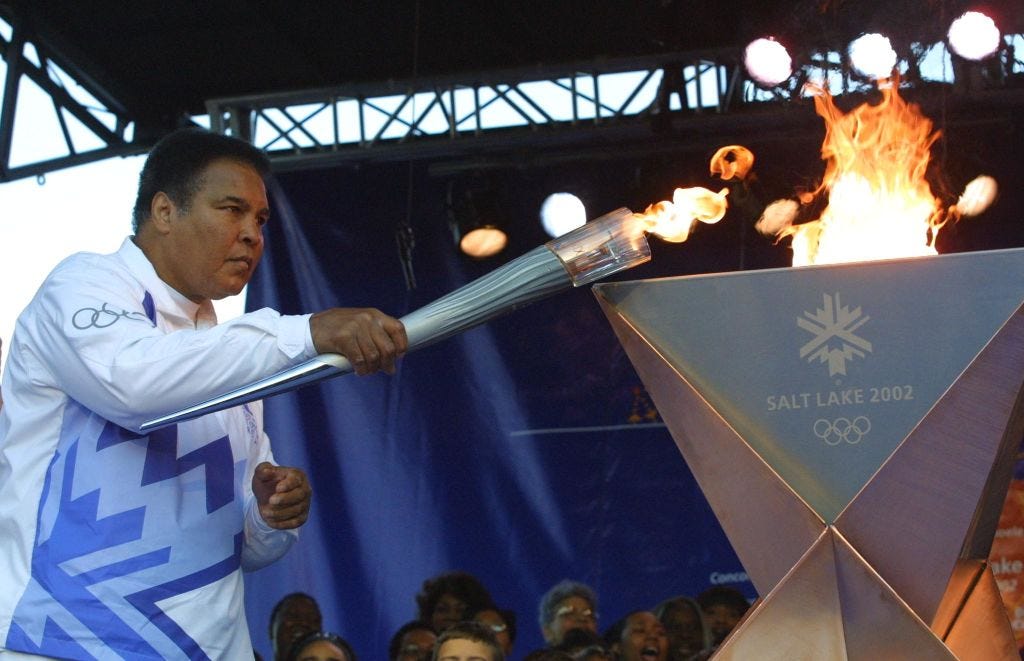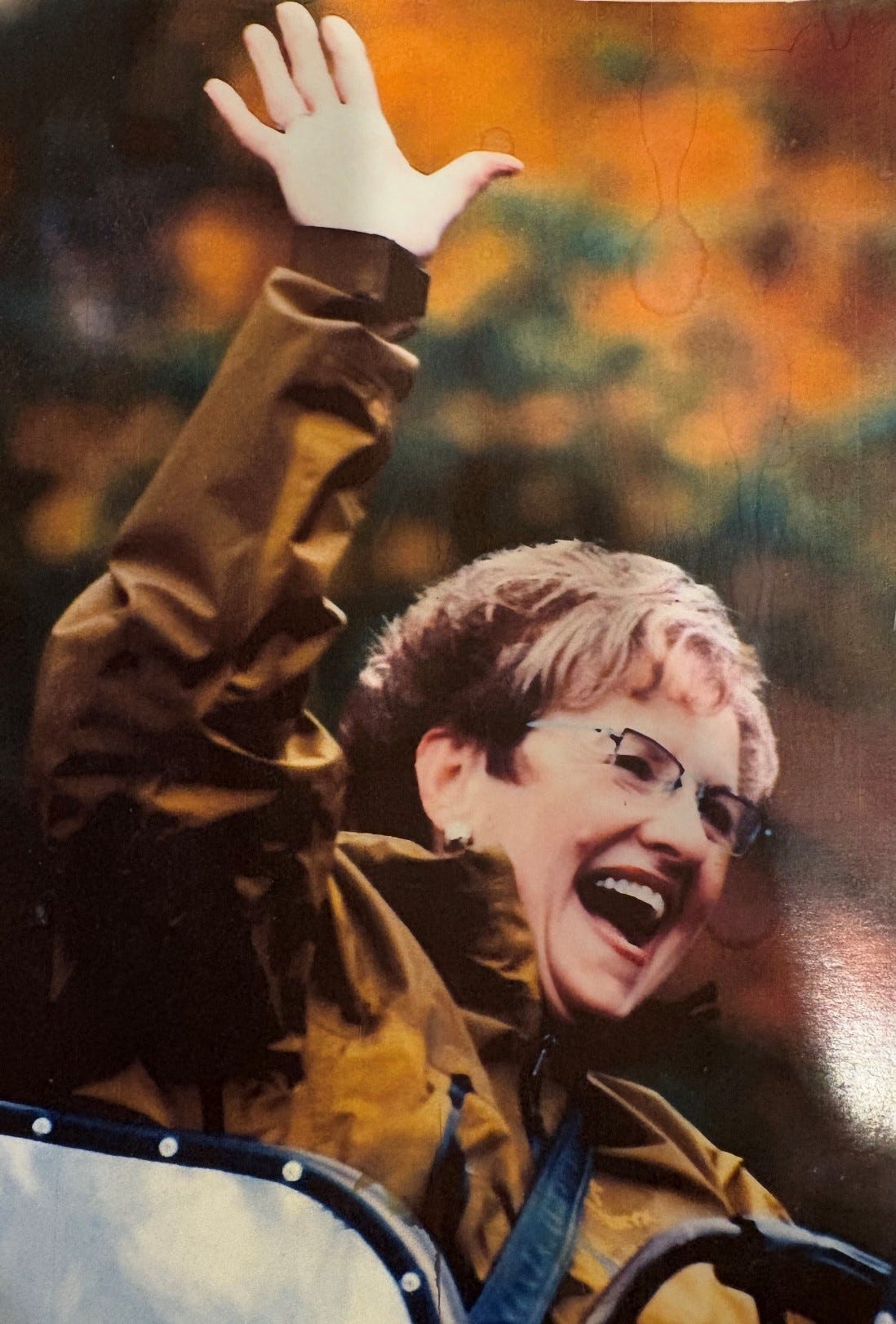Her Divine Dividend
How caring nourished a life of meaning
Mom died last week. Naturally, I thought of Muhammad Ali.
Not at first, but shortly after Tom called with the news. Shortly after we conferenced in Katy and Mom’s sister, Sara. Shortly after we shed our first tears and found a bit of laughter. And right after a sense of relief crept up alongside our sadness.
I suspect few times are good times to pass away. In the middle of the night, sleeping peacefully, and approaching your fifth anniversary in memory care might qualify as one.
The four of us dug up the list of friends and family we’d compiled three years ago after Dad and leukemia made peace, then divvied up the responsibilities—Tom coordinating with the funeral home and planning the celebration of life, Katy and Sara starting on the contact list, while I took on the obituary.
I pieced together Mom’s life in chronological order—the way we tend to do it in America, and the way we did it for Dad. Born here and schooled there. Majored in this, minored in that. Married here; started a family there. Accomplished this. Contributed to that.
Rough draft complete, I stared at the screen. There they were—Mom’s high points. Her life’s markers. A compendium of fullness. Yet, it felt like so many others I’d read.
Something was missing.
Mom was missing.
Her essence was missing.
Mom wasn’t her milestones. She was underneath them. She was between them. She was in them—her one-of-a-kind special thread running from her family of origin, into her husband, through her kids, outward to her friends, and beyond to all she touched.
I felt her heartbeat in the millions of moments between the markers… and that’s when Ali appeared.
Muhammad Ali—Olympic gold medalist, heavyweight champion of the world, and humanitarian—proclaimed himself the greatest before he actually became the greatest.
He appeared not because Mom was the greatest—though she was pretty darn great—and not because, at the end of his long journey with Parkinson’s, he contended with dementia like Mom had, but because a single line of his rose up in me.
“Service to others is the rent you pay for your room here on earth.”
As my heart raked the ground underneath Mom’s milestones—thoughtful sister, selfless wife, steadfast mother, devoted grandmother, and dear friend to so many—her life of service glowed, illuminated through those millions of moments that defined her.
Mom served.
My mind flashed to my dear friend Susan, mother of twins, and a lunch we shared when my girls were two. I’d barely sat down when she looked at me and said, “Oh boy. You’re still in the pure service years.”
Nice, I thought. “Do I look that spent?”
“You can’t tell yet,” she continued, “but it will start to get better. Your daughters will start to feed themselves, then bathe themselves. They’ll eventually stay in their own beds at night. They’ll start playing together, and when they do… you’ll get big clumps of your life back.”
Years later I discovered Susan was right—and so did my wife Karen, who described that time as one when she started to see in color again.
My mind traveled back in time to Iowa, where during Dad’s residency they started our family—my brother and me, Irish twins less than a year apart. I imagined how exhausting it must have been for Mom, Dad working and sleeping round the clock while Tom and I tore through the house. Daycare? Disposable diapers? A microwaved meal? Not in the 1960s.
Pure service—Mom paying rent, not by the month, not even by the day, but moment by moment.
And then… when I was five and Tom was six, right about the time Mom was due for a break, right about the time it was to get better—when Mom could put the oxygen mask back on herself and finally see in color again—she and Dad re-upped. They started over, expanding the family with Katy and Libby, a second set of Irish twins.
Four kids, seven years apart.
More mouths to feed, more clothes to buy, and more laundry to fold. More rent to pay—and she’d raised it herself. If there was a credit card for time and energy, Mom surely would have maxed it out now and then.
I wondered how she did it. I marveled at the thought of it. Then it occurred to me that maybe she wasn’t completely depleted. My early memories were filled with Mom smiling. Singing. Laughing.
Mom served all right. But it didn’t feel like her service came from a place of obligation. And it didn’t feel like it was only costing her. I wondered—could it be nourishing her?
Maybe, I thought, Ali didn’t fully get it. Perhaps because he wasn’t a mother.
And that’s when another mother came to mind.
Teresa.
Mother Teresa.
This time, something she once said crept back into my awareness:
“Not all of us can do great things, but we can do small things with great love.”
Small things, with great love.
I realized that was core to Mom’s genius—not doing the big, showy things, but in elevating the small, constant things with her love.
It wasn’t just feeding four mouths but fixing our favorites—tacos for Katy, Sloppy Joes with mustard on the bun for me, tuna noodle casserole for Tom, and Swedish pancakes smothered in powdered sugar for Libby. It wasn’t just getting us clothed but driving clear across town for Ralph Lauren shirts that would be stained within a month and wide-leg jeans that would rip before we knew it. And it wasn’t just signing us up for any summer camp to claw back time for herself, but finding the perfect horse camps for my sisters and the right basketball camps for my brother and me. Even if it meant driving twice as far.
Small things with great love.
As my insides swelled with chapters wrapped in deep affection, I wondered: if the totality of Mom’s life were a tapestry woven by service and stitched with love, what color would Mom’s unique thread be?
The answer came almost instantly—and not from anyone famous. Mom served because she loved, and she loved because she cared.
Mom cared.
Caring was her color.
I thought about the difference. We carry love inside us—we can hold it and let it warm us. But caring? It’s hard to hold. Caring is love’s motion. It’s love made visible. Unlike love, we can’t care and stay still for long.
Mom’s caring spent ten more minutes in the aisle of the store, picking just the right birthday card. Her caring wrote the heartfelt message inside. Her caring called friends, time and again, just because. Her caring stayed present when exasperated or embarrassed—like sitting at my YMCA basketball games watching me argue one of a thousand fouls I didn’t commit.
Her caring even earned her a nickname: “The Corrector,” as she corrected grammar with a smile—maybe Mom’s signature act—whether with her own kids or with a house full of our teenage friends. “No, it’s not ‘me and him are going to the movies’!” Mom would boom, still chuckling. “That’s grammatically incorrect. Use the subjective case: ‘he and I are going to the movies.’”
…Huh?
Small things, with great love, and tender care.
Which brings us to Mom’s final years in memory care. I was curious—when the caregiver could no longer care—what was left of her essence?
I reached out to Mom’s caregivers and asked, “What was she like in these final years?” I didn’t know what to expect—hadn’t thought that far ahead. But what they said drew me close to her tender presence in those final times.
“When I put Brada to bed at night, I would squeeze her hand. She’d squeeze mine back—not because she didn’t want me to leave, but because she wanted to hold me.”
“Brada would look into my eyes, with that twinkle in hers, as if saying, ‘thank you.’”
“Brada would reach out to me. When I took her hand, she’d pull me in and kiss me on the forehead.”
“When I’d arrive in the morning, Brada would give me a nod. Sometimes a wink. Most of the time she’d smile. In the early years, we’d hum music together. She wanted to keep me company.
“Brada would reach for me and caress my cheek. When she touched it, she touched my heart.”
“What was it like as Brada’s caregiver? With Brada, it was never one way… she cared back.”
She cared back.
Of course she did, with all she had at the end—the tiniest gestures, the gentlest love, and the tenderest care.
At the end of her 85 years, Mom left us an alternative to Ali’s charge—one that doesn’t drain but sustains. One that doesn’t cost but rewards. One that nourishes.
Caring for others offers us a divine dividend—one that fills us with meaning—during our brief time here on earth.
As Brada ascends to the home beyond all homes, may her divine dividend live on in the way we serve, the way we love, and the way we care.
If you have a reflection about your mother, or father, or someone close to you, please share it in the comments, I’d love to hear.
As always, please share freely if you wish.
If you’d like receive On Money and Meaning directly, you can do so by signing up below.




This piece is certainly a gift to your mom and all who knew her James, a wise and profound seeing of the human who was your mother, but it's also a tutorial and inspiration for those of us who still have our parents about how to appreciate the time we have that remains with them. The parts that detail the specifics of caring moved me most. I'm sure there is no way I could possibly enumerate all the forms of caring and noticing that were exacted by my parents for my benefit from times I can't consciously recall, but when I feel the urge to care for others I know it's the caring I received that is reaching right through to further generations. As they say, it's impossible to repay the debt we owe our parents, but caring forward is probably the closest we can come.
James, what a beautiful and moving dedication to your mother. I’m often astounded by how many quiet angels surround us each day—people who carry out the smallest and humblest acts with the greatest love. Your words capture that truth so powerfully. And ultimately, what better legacy could there be?